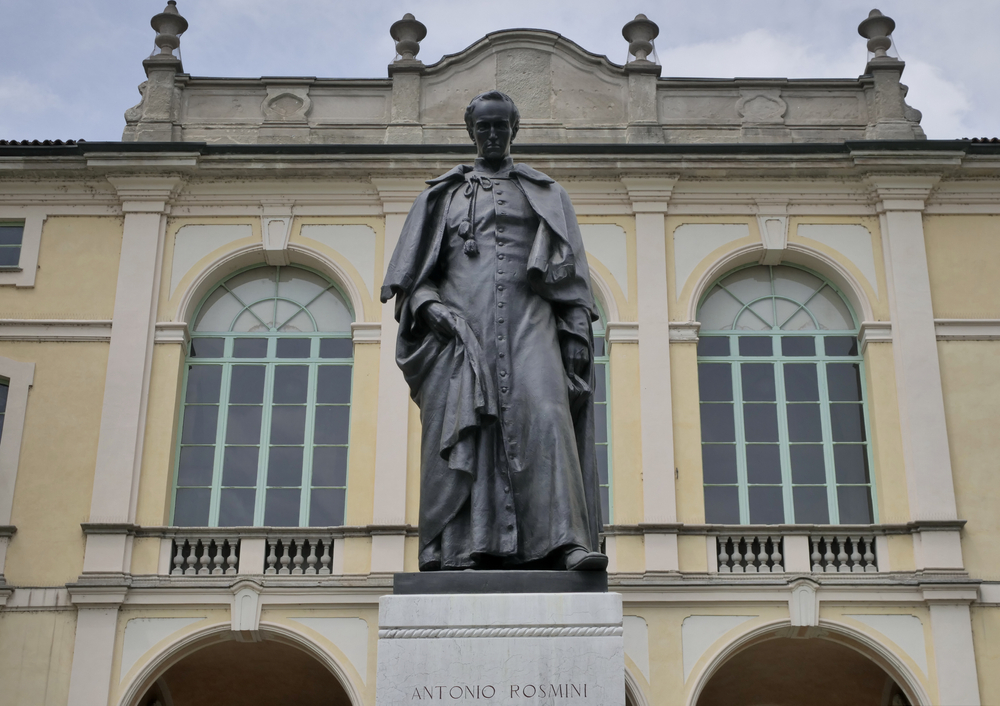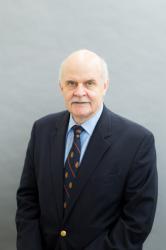Christian philosophy and morality were far from my intellectual radar during the 1970s when I decided to focus on economic studies. At the time I was captivated by the writings of Ayn Rand. Rand respected Aristotle’s and Aquinas’ logical analyses but despised the latter’s religious tone and foundations. Later, when I went more deeply into these philosophers’ writings, I abandoned Randianism.
Debates in Christian philosophical circles are numerous, even among those who profess respect and admiration for Aquinas. I have come to appreciate different aspects of the teachings of philosophers, theologians, and moralists who had significant disagreements among themselves. One example is my admiration and respect for two prolific 19th-century intellectuals who had a remarkable impact on the Catholic world: Fr. Antonio Rosmini-Serbati (1797–1855) and Matteo Liberatore, S.J. (1810–1892).
Regarding Rosmini, Fr. Robert Sirico, in his foreword to the 2007 edition of Rosmini’s The Constitution Under Social Justice, wrote: “Like Lord Acton, John Henry Cardinal Newman, and Count Alexis de Tocqueville, Fr. Antonio Rosmini was one of those comprehensive nineteenth-century Catholic thinkers whose breadth and depth of thought and analysis may be seen as all the more remarkable from the distance of time.” Professor Carlos Hoevel of the Pontifical Argentine Catholic University, one of the leading experts on Rosmini, wrote in his own foreword to the same edition that the book“formed what was perhaps one of the first Catholic [treatments] of modern political and economic liberalism.” And yet, as many in the Catholic Church could not distinguish between “Rosmini’s liberalism and the extremist liberalism of the French Revolution,“ The Constitution ended up on the Index of Forbidden Books. More than a century later, however, John Paul II rehabilitated Rosmini and even recommended starting his cause for canonization. Rosmini’s beatification took place on November 18, 2007, in Novara, Italy.
Matteo Liberatore also left a significant legacy. With Luigi Taparelli D’Azeglio, S.J., he was one of the founders of the magazine La Civiltà Cattolica. He worked hard to restore a Thomistic understanding of natural law in Italy. J.H. Fisher wrote that Liberatore “was regarded by many as the greatest philosopher of his day” (Catholic Encyclopedia, 1910). Liberatore’s last book, Principles of Political Economy (1889), in which he elaborated his views on property rights, was very influential in the drafting of Leo XIII’s encyclical Rerum novarum (1891).
Liberatore and Rosmini were strong defenders of property rights and other essential aspects of a free economy. However, Liberatore strongly criticized Rosmini’s reliance on reason alone as practically sufficient in itself to deduce principles of natural law and make moral judgments. Similar positions had been taken in earlier eras—for instance, many attacked Hugo Grotius (1583–1645) for developing some of his analyses “as if God did not exist.” Some of the Catholic late scholastics, who also stressed the importance of human reason, had used phrasing and ideas similar to Grotius’ long before the Dutch humanist published his works. The attacks on Rosmini remind me somewhat of the Grotius controversy: Even Lord Acton thought that Grotius’ phrasing was unfortunate. Yet Rosmini based his position on Aquinas’ statement that “goodness and being are really the same and differ only in idea.” Using reason to understand either gives us knowledge of both.
But Liberatore argued that Rosmini had gone too far. He wrote that the “atheistic school of liberals” was encouraged by Rosmini’s views. “If the liberals look favorably at Rosminian philosophy, they have good reasons for doing so.” Teachers and students could avoid relying on God to seek truth and use reason alone to understand “being.” When I read Liberatore’s criticism, I said to myself, “Great! Perhaps Rosmini’s contributions can be a road to bring followers of Ayn Rand and other liberal atheists to the vision of the human person that inspires the Acton Institute.”
Furthering his criticism, however, Liberatore wrote: “There is no doubt about it. The Rosminian system is German Transcendentalism in Italian dress.” Liberatore did not focus on Rosmini’s personal goals: “I willingly admit that Rosmini entered into this cloud-land with the best intentions. But the blunder was that, in order to fight his adversaries with equal weapons, he accepted their method and their principles.” Liberatore’s harshest words are toward the end of his lengthy book, when he summarizes his criticisms by stating that Rosminian philosophy “might be defined as the devastation of Catholic theology.”
History, though, was kind to Rosmini. John Paul II regarded the separation between reason and faith as a tragedy. In the encyclical Fides et ratio, he included Rosmini among the modern proponents of the dialogue between faith and reason: “We see the same fruitful relationship between philosophy and the Word of God in the courageous research pursued by more recent thinkers, among whom I gladly mention, in a Western context, figures such as John Henry Newman, Antonio Rosmini, Jacques Maritain, Étienne Gilson and Edith Stein.”
When I ponder the current disputes among Christians, I see that, as with the differences between Rosmini and Liberatore, they promote many aspects of a free economy but disagree in degree and in their philosophical foundations. Looking back on the many battles of the past, like the one waged by these two Italian priests, I take some comfort in what we are witnessing today. Influential Christian intellectuals are attacking each other as I have not seen before, true. Yet the vitriol should not prevent the independent reader from learning from the best contributions of opposing philosophical figures. As time has proved, both Rosmini and Liberatore deserve to be read, especially on economics. Who today needs to be read, thoughtfully considered, with an eye toward history?
Liberatore, Matteo, S.J., On Universals: An Exposition of Thomistic Doctrine (London: Art and Book, 1889)
Rosmini, Antonio, The Constitution Under Social Justice (Lanham, MD: Lexington Books, [1848] 2007)

